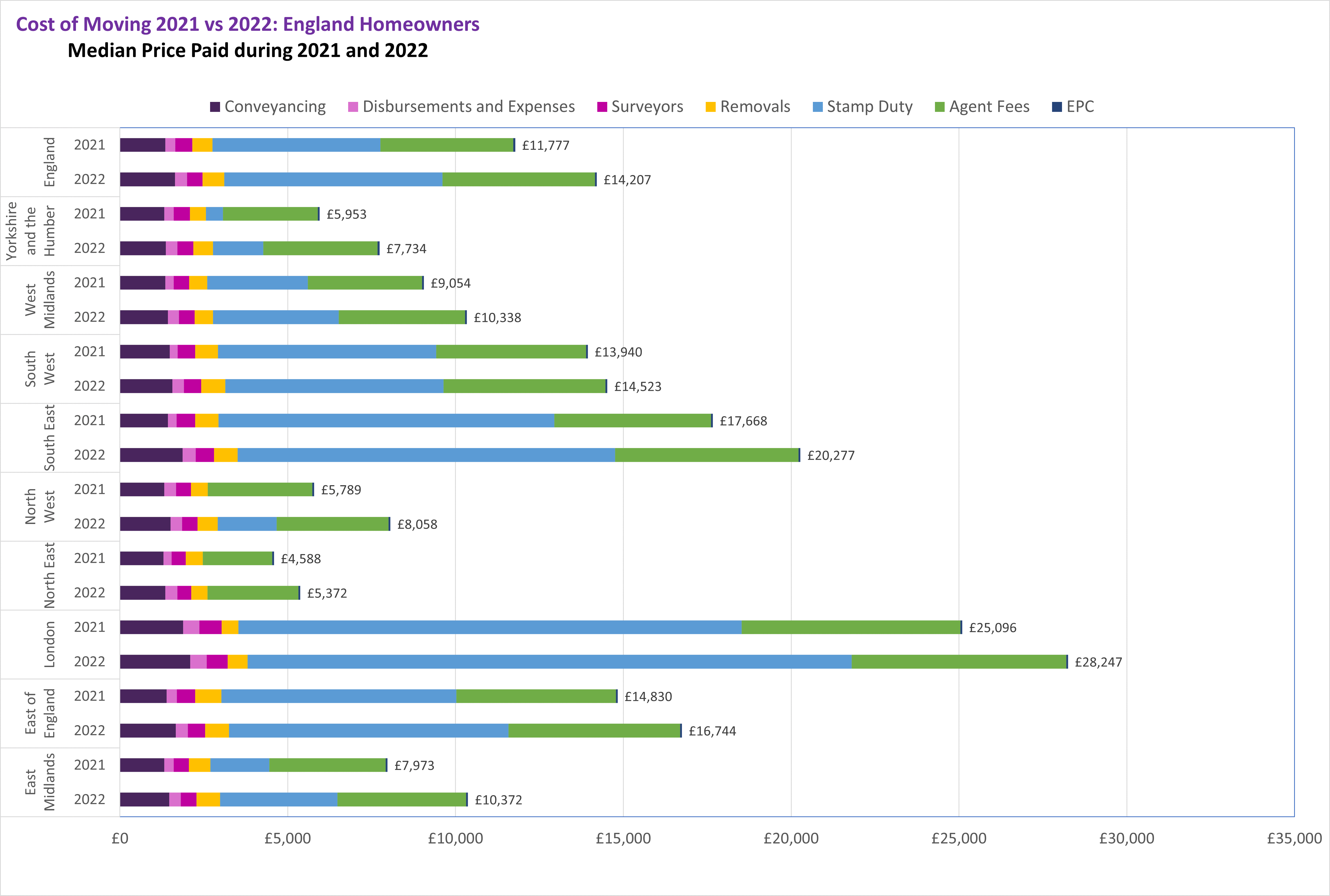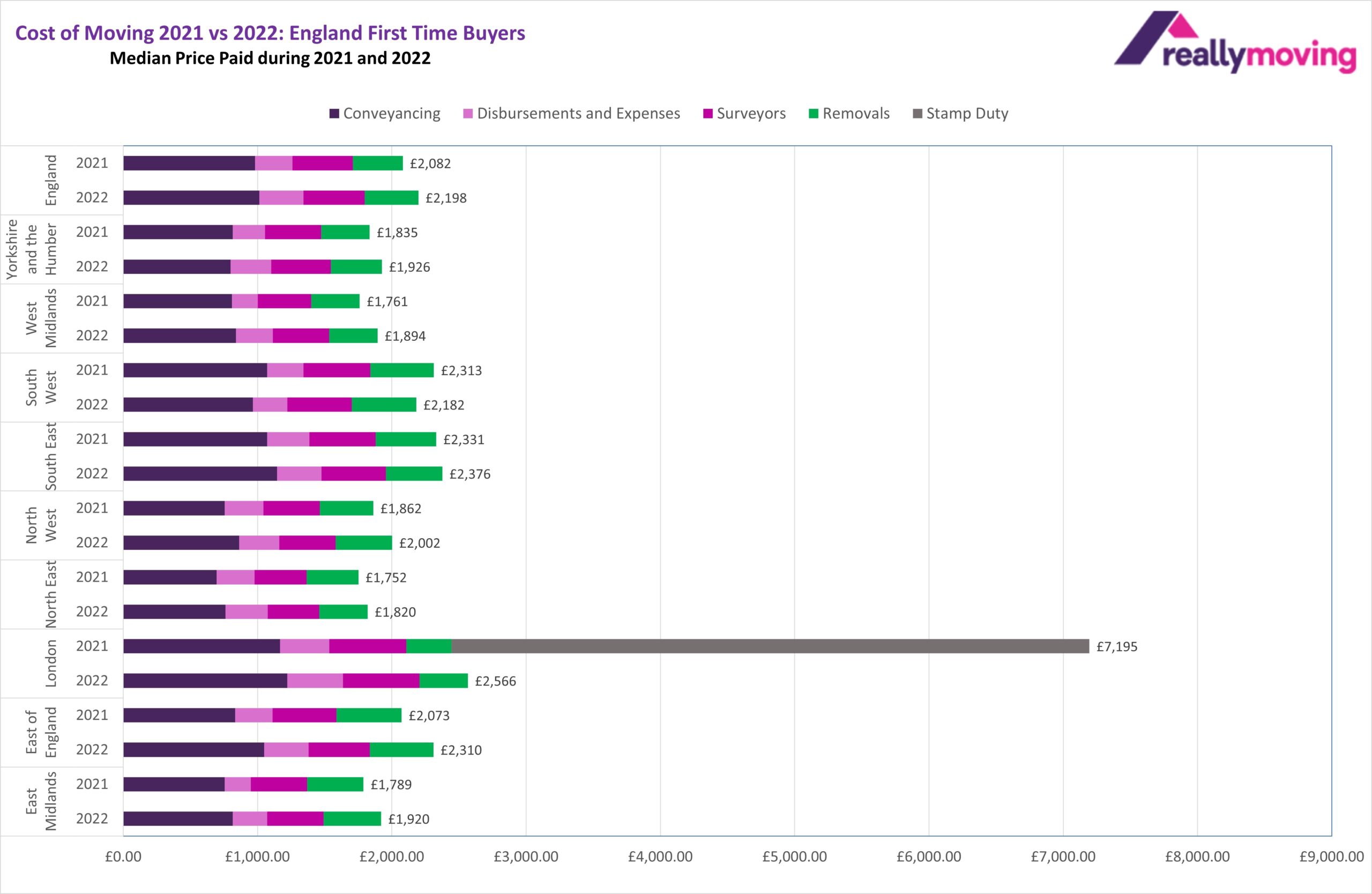Cost of moving home in England jumps nearly £2.5k to record high of £14,207
The cost of moving home has jumped 21% over the last year from £11,777 in 2021 to a new record high of £14,207, according to reallymoving’s annual Cost of Moving research.
Key points from report:
-
- Despite immediate Stamp Duty cuts, the cost of moving home in 2022 is 21% higher than last year
- Rising house prices have pushed conveyancing costs and estate agent fees up by 21% and 15%
- The North-West, Yorkshire and East Midlands have seen biggest hikes in upfront costs
- Stamp Duty aside, the cost of buying and selling a home has still risen by 14% annually
- First-Time Buyers in England have seen overall moving costs increase by 6% to £2,198
- FTBs in London, benefiting most from Stamp Duty reform, are now paying £2,566 to move – a fall of 64% compared to 2021
This means that despite news of immediate and permanent cuts to Stamp Duty, the average person now buying and selling a home in England is required to find £2,430 more in upfront costs than in 2021.
The comparison site for home movers has analysed data from 714,000 quotes in the last year to reveal that it’s more expensive than ever to move home. Despite a fall in the cost of a survey and Stamp Duty cuts announced in the ‘mini-Budget’, sharp rises in conveyancing fees, estate agent fees and removals have pushed moving costs upwards. This is due to rising house prices which directly impact costs such as conveyancing and estate agency fees (calculated as a percentage of the purchase price), as well as inflationary pressure and high demand for services.
Based on the median purchase price of £380,000, Stamp Duty is the largest expense facing home movers in 2022 at £6,500, followed by estate agent fees at £4,544 (+15%), conveyancing fees at £2,003 (+21%) and removals at £649 (+8%). Surveying costs have fallen by 10% over the year to an average of £456, while the price of an Energy Performance Certificate (EPC) remains unchanged at £55 for the sixth consecutive year.
Table 1: Annual change in the cost of moving home in England in 2022:
|
Homeowner Buying & selling |
2021 |
2022 |
% Change |
|
First-Time Buyer |
2021 |
2022 |
% Change |
|
Stamp Duty |
£5,000 |
£6,500 |
+30% |
|
Stamp Duty |
£0 |
£0 |
0% |
|
Estate Agent fee |
£3,965 |
£4,544 |
+15% |
|
Estate Agent fee |
£0 |
£0 |
0% |
|
Conveyancing |
£1,650 |
£2,003 |
+21% |
|
Conveyancing |
£1,260 |
£1,342 |
+7% |
|
Survey |
£507 |
£456 |
-10% |
|
Survey |
£450 |
£456 |
+1% |
|
Removals |
£600 |
£649 |
+8% |
|
Removals |
£372 |
£400 |
8% |
|
EPC |
£55 |
£55 |
0% |
|
EPC |
£0 |
£0 |
0% |
|
Total |
£11,777 |
£14,207 |
+21% |
|
Total |
£2,082 |
£2,198 |
+6% |
(Source: reallymoving)
Table 2: Annual change in median property price:
|
Homeowner Buying and selling |
2021
|
2022
|
% Change |
|
First-Time Buyer |
2021
|
2022 |
% Change |
|
Purchase |
£350,000 |
£380,000 |
+8.6% |
|
Purchase |
£210,000 |
£249,950 |
+19% |
|
Sale |
£280,000 |
£320,000 |
+14.3% |
|
|
|
|
|
(Source: reallymoving)
Home-movers in the North and Midlands face largest rises
The cost of moving home has risen the most in the North of England and the Midlands due to increasing conveyancing and removal costs and, in the case of the North-West, due to rising house prices pushing people above the Stamp Duty threshold based on an average purchase price of £285,000. Moving costs have risen by 39% for buyers in the North-West, 30% for those in the East Midlands and 30% in Yorkshire and the Humber, while movers in the North-West are paying 17% more to move.
Londoners First-Time Buyers see moving costs plummet 64% thanks to mini-Budget
Moving costs in the capital have risen by 13% over the last year to an average of £28,247. This is double the national average cost of moving and almost three quarters of the median annual full-time salary in London (£39,716), according to data from the ONS. After Stamp Duty, the biggest increase in costs for home movers in the capital comes from removals, with price rises of 18% over the last year, followed by conveyancing (+9%). It’s a different story for First-Time Buyers in London however, who are the biggest winners from the mini-Budget. Thanks to an increase in the Stamp Duty threshold to £425,000, the average FTB in London will no longer pay any Stamp Duty, bringing their cost of moving down by a massive 64% to £2,566, compared to £7,195 a year ago.
First-Time Buyers across rest of UK see modest price rises
First-Time Buyers in England have seen overall moving costs rise by a relatively modest 6% to £2,198. With median property values meaning First-Time Buyers now avoid paying Stamp Duty in every region of the UK, the overall cost of moving is much less volatile with an 8% rise in removals costs, 7% increase in conveyancing and a 1% rise in the price of a survey. London remains the most expensive location for FTBs to buy a home, but not by much. It’s closely followed by the South-East (£2,376), the East of England (£2,310) and the South-West (£2,182).
Rob Houghton, CEO of reallymoving, said:
“At a time of soaring inflation and rising interest rates, the prospect of record high moving costs is bound to deter some non-essential home moves.
“Despite the welcome Stamp Duty cuts announced in the mini-Budget, which have had a big impact on First Time Buyers in London and the South-East in particular, rising house prices over the last year and the associated impact on the cost of services such as conveyancing and estate agent fees mean that moving home now eats up almost half of the average UK salary of £31,772.
“Moving costs for First Time Buyers are thankfully more stable but with mortgage affordability declining, record high rents and rising inflation making it even harder to save, finding £2,198 in up-front costs on top of a deposit is extremely challenging.
“While there is no simple fix, there are several measures movers can take to help manage costs. Shop around, using well-priced and well-reviewed conveyancers, surveyors, removers, and estate agents.
“It’s a good idea to plan ahead to try to move at a quieter time such as in the new year, when there’s less competition for services. And book your removals firm well in advance, ensuring they visit your home to assess the volume of belongings so you’re only paying for the space you need. Most people want to move on a Friday, so some firms will offer mid-week deals that help keep costs down.”
Kindly shared by reallymoving
Main article photo courtesy of Pixabay




















